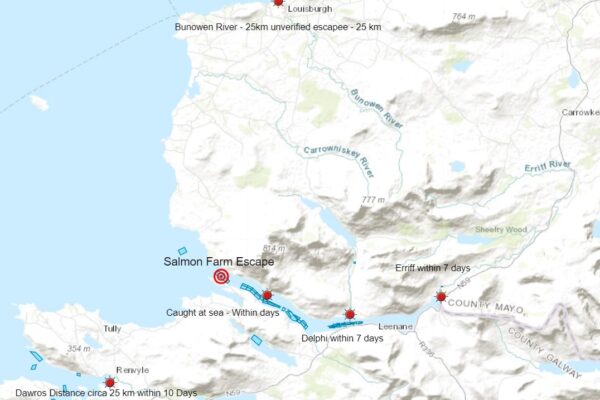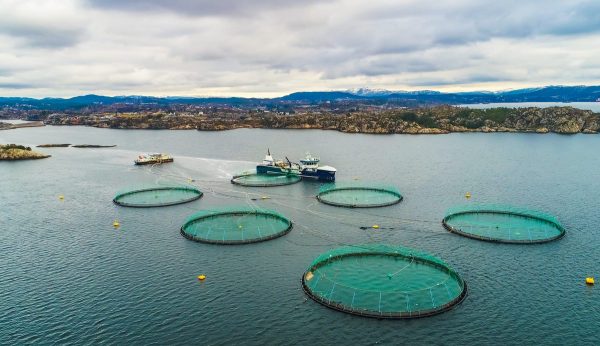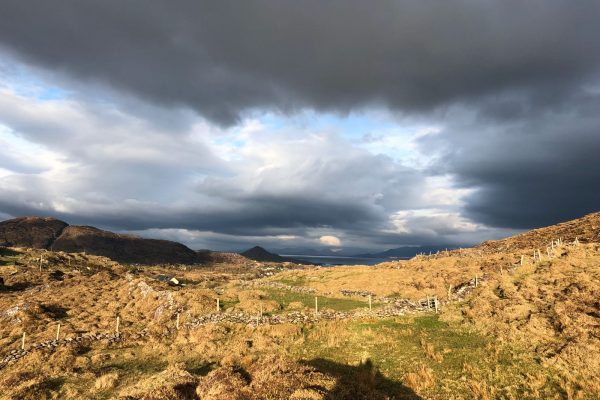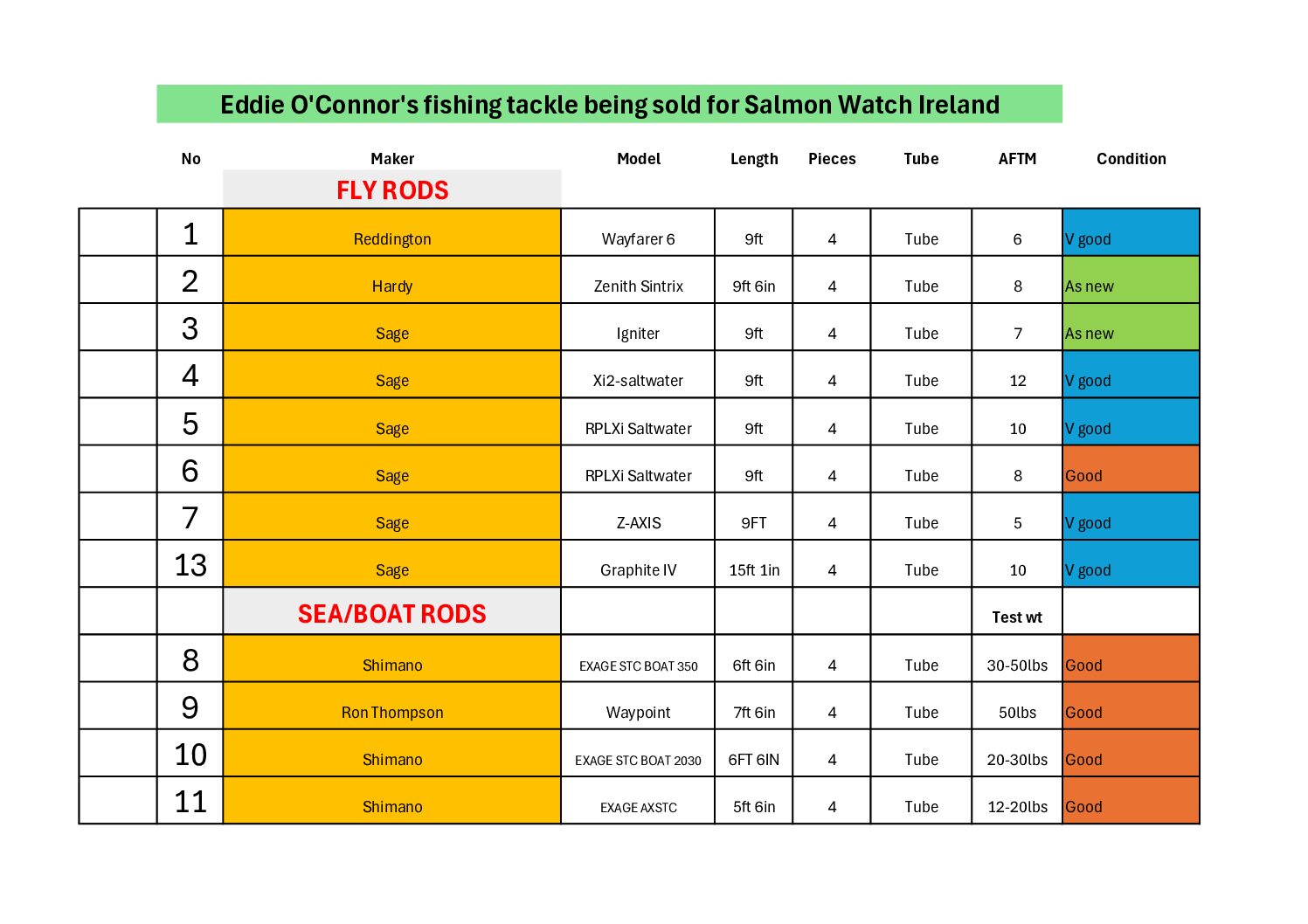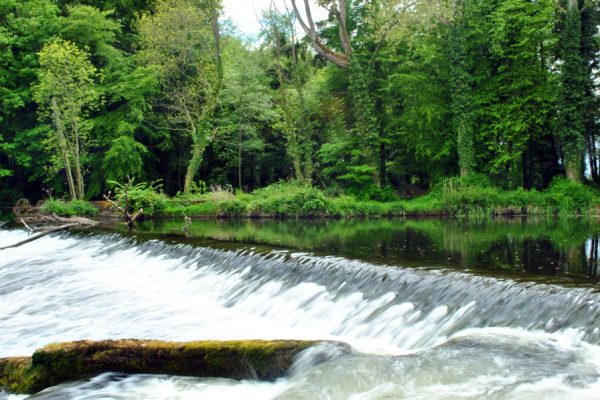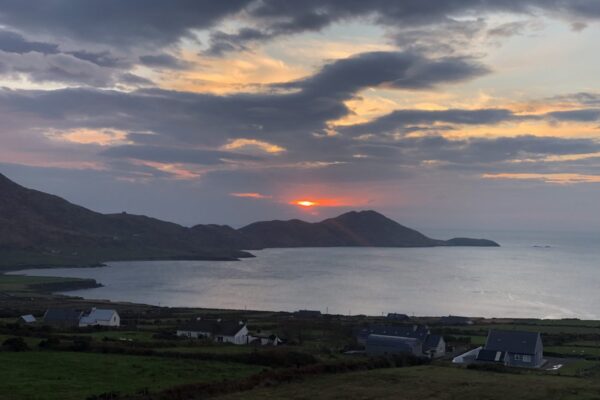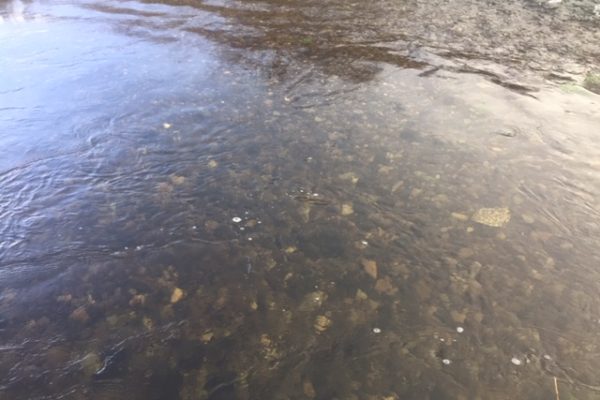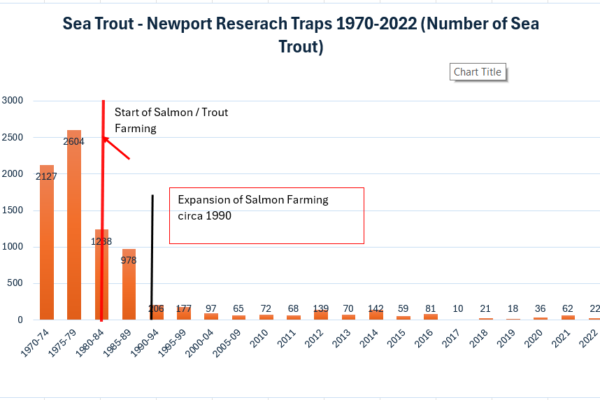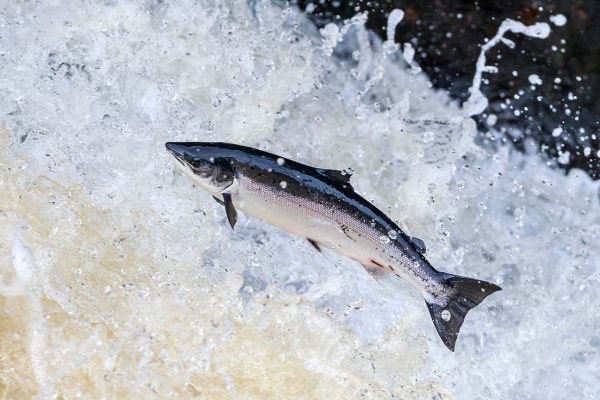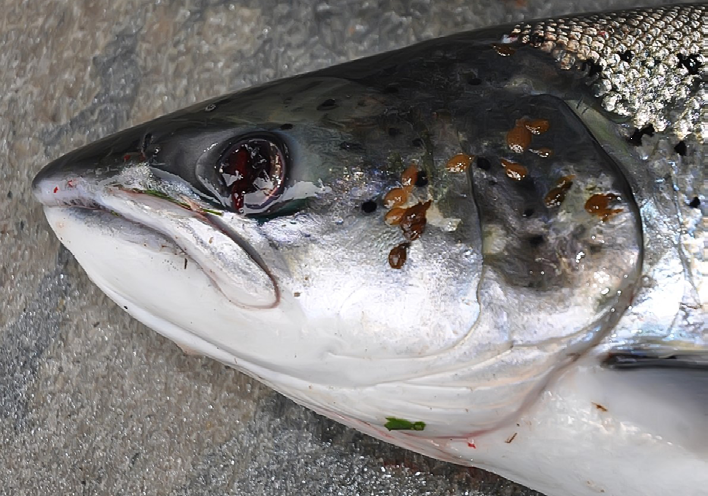-
Update -Escapee Salmon on the move and fast: Farmed Salmon Caught Owenmore River
Reports coming in of farmed salmon caught on Owenmore River which is over 70 km from Killary within seven days. Is this fish from Killary or has there been another escape? Escapee salmon from Rosroe salmon farm in Killary have migrated long distances over the last ten days. These fish which have compromised genetics and may in time breed with wild salmon should at all costs be removed by any means possible. These fish have been caught both in the sea by anglers fishing for mackerel but more alarmingly have entered rivers both within Killary Harbour and further afield. Some have traveled over 25km north to the Bunowen and south as far as the Dawros system. These fish are being caught in these systems by anglers and should immediately be killed and reported to Inland Fisheries Ireland. The operator of the farm has suggested that these fish may not mature until 2025 but little is known of how they develop when released into the wild and thus may pose a risk this spawning season. There are many small rivers with unique genetic salmon populations and these are at high risk of damage by escapees through interbreeding. Disease may also pose a risk to all wild salmonids both near and far. There is every risk that the escapee salmon will continue to migrate and pose a risk to populations along the western sea board. There are a number of rivers within the area which are part of conservation areas which have wild Atlantic salmon as a qualifying interest and this highlights the unacceptable risk posed by open cage farming. There is no safe way to protect wild salmon if these farms are not moved onto land.
Continue reading -
Salmon Farm Escape – Killary Harbour , County Galway
Salmon Watch Ireland has been alerted this morning to a large escape of farmed salmon from Rosroe salmon farm in Killary Harbour which occurred on Sunday, 11th August. The escape appears to have been caused by a fish farm boat colliding with salmon cages which resulted in an escape of farmed salmon numbering over ten thousand fish. It must be stressed that this figure may be an underestimate as it is likely that accurate reporting of such escapes are at best, estimated. The farmed salmon are 1.5 kg to 2kg in weight and reports indicate that large numbers can be seen throughout Killary Harbour. The farm licence is listed as owned by Docon Limited, Mulranny Co. Mayo with a recent transfer from previous owners in October 2023. Local information suggests that MOWI have a substantial interest in this farm. Salmon Watch Ireland would like to ascertain if all operating procedures were put in place to safeguard the cages prior to this incident and if all necessary reporting steps were taken once the escape was discovered. We would also like to know if steps are to be taken to trap the escapees and prevent them from entering the nearby wild salmon catchments. In the recent decision by Judge Holland in relation to the Bantry Bay Judicial Review, he noted that the EIA was not comprehensive enough as it related to specification and structural integrity of the cage infrastructure. This incident once again highlights the dangers and risk of damage to farms and highlights the very real risk to wild salmon genetics. These fish may in time enter rivers and interbreed with the wild salmon both in Killary harbour catchments and indeed further afield. We regard the removal of open cage technologies as a priority to protect wild salmon and are calling on DAFM to reconsider siting these farms at sea. In the interim it is of the utmost importance that the maximum number of escapees are captured to reduce risks to local wild salmon populations. We encourage anglers to report and remove farmed salmon if caught and we strongly suggest that Inland Fisheries Ireland and the Marine Institute should facilitate a program of removal by all available means.
Continue reading -
Fish Counter Report 2023- Significant decline noted in grilse and late summer salmon
There would appear to be a significant downturn in 1SW salmon in 2023. This is very much in line with angling and commercial catches in 2023 and is in line with majority of countries in NE Atlantic which saw a substantial decline across all regions. The indicators would suggest that this year has seen a significant upturn on last years grilse run but spring salmon in 2024 is suggestive of poor survival of the same smolt cohort which supplied last years grilse. As this downturn is widespread it suggests a large downturn of conditions at sea. The report can be read here: IFI Fish Counter 2023
Continue reading -
Deenish Island – Six years and counting
The MOWI (Deenish Island) owned salmon farm located within nine kilometres of the once famous Waterville sea trout fishery has once again escaped judgement by the Aquaculture Appeals Board. This farm was officially ordered to close in April 2019 but has since operated unchallenged while pursuing an appeal against the closure. The sea trout fishery is effectively abandoned with a substantial loss of economic activity and the loss of many jobs associated with angling tourism. The text of the letter is as follows: "I refer to my letter of 05 September 2023 in which the Board indicated it anticipated this Appeal would be determined by 30 September 2024. The Aquaculture Licences Appeals Board (ALAB) reviewed this timescale for the determination of this Appeal at its meeting on 25 July 2024 and has formed the view it will not be in a position to determine these Appeals within that timeframe due to the ongoing collation of technical advice and the vacant position of an internal ALAB Technical Advisor. In light of this, as provided for in Section 56(3) of the Act, the Board hereby gives notice of its intention to determine this Appeal by 31 January 2025." The ongoing damage to Waterville and its angling reputation is continuing while sea trout stocks continue a rapid and accelerating decline. While Salmon Watch Ireland has successfully taken judicial review proceedings in regard to Bantry Bay we are conscious that the Deenish situation should be prioritised by all concerned with bringing back stability to sea trout stocks with economic benefits accruing to the local community. We are disappointed with the apparent apathy demonstrated by some within the local business community despite the best efforts of the local angling association (Currane Fisheries) and other conservation bodies to highlight the devastation occurring. This area more than ever needs sustainable tourism business and it is shameful that a lake like Lough Currane has effectively been consigned to the history books by the salmon farming industry. Make no mistake, salmon farming in open cage technology cannot coexist with healthy sea trout populations. It is also infuriating that the Aquaculture Licence Appeals Board has effectively allowed MOWI to delay and consistently mend their hand in relation to this appeal. Recent submissions by Salmon Watch Ireland regarding Deenish Island: Submissions to ALAB - Deenish Island
Continue reading -
Eddie O’Connor’s fishing tackle being sold for Salmon Watch Ireland – Fundraising for a good cause.
Please Support Atlantic Salmon Conservation Kindly donated by the late Dr Eddie O Connor Attached is a catalogue of fishing tackle belonging to the late Dr Eddie O’Connor which is being sold to raise funds for Salmon Watch Ireland. The collection of tackle has been donated by Mrs Hildegaard O’Connor in commemoration of Eddie’s longstanding commitment to salmon conservation. If you are interested in acquiring one or more of these pieces, please make what you consider to be a fair offer having regard to the quality of the item and the cause for which it is being sold. An inspection of the item(s) of interest can be done in Dublin. The cost of shipping (if any) will be added to the price. You will note that the collection includes three reels made for Eddie by the renowned US company, Tibor (#s 23, 24 and 25). The two marine reels (#s 23 and 25) are, according to Tibor, equally suitable for salmon and trout. I would expect offers for these reels to reflect their quality – they are really special and in very good condition. I was with Eddie when, at different times, he caught tarpon and giant trevally on the Gulfstream! Similarly, the Nautilus reel (#28) is a quality piece of equipment suitable for fresh- or salt-water use. Needless to say, no warranties are being offered with these pieces. Where the reels are concerned, I have assured myself that those been offered are in working condition and, as the catalogue records, I have discarded three as being below standard. Please contact me at niall.b.greene@gmail.com if you have an interest and we can carry the matter forward from there. Feel free to pass this message on to others who might have an interest in pieces from this collection. UPDATE FROM SALMON WATCH IRELAND - HIGH COURT ANNULS LICENCE FOR SHOT HEAD/BANTRY BAY SALMON FARM The High Court recently annulled a licence awarded by the Aquaculture Appeals Board (ALAB) to MOWI to operate a new farm at Shot Head in Bantry Bay. A judicial review of the decision had been sought by Salmon Watch Ireland, Inland Fisheries Ireland and FISSTA. Go to High Court Judgement for more information on this significant decision in the struggle against open cage salmon farming. Catalog - Dr. Eddie O Connor
Continue reading -
Barriers Report – Joint Oireactas Committee
The Committee agreed to examine the issue of barriers to fish migration in Irish rivers as part of its 2024 work programme. The Committee held a number of public engagements and received written submissions on this issue and acknowledged the difficult balance between flood risk management and conservation and enhancement of fish populations.This report contains ten recommendations which the Committee feels will serve to meaningfully address factors inhibiting the effective removal and mitigation of barriers in the Irish river network. Barriers Report 2024
Continue reading -
Atlantic salmon – Coming home earlier, smaller and in a compressed time period
The annual EPA conference took place in June 2024 in Galway. Summarising 70 years of research in the Burishoole Catchment, Elvira De Eyto outlined in a very concise and illuminating video presentation how climate data and water quality have changed within this index catchment over 70 years. Our interest is primarily the data surrounding Atlantic salmon and the presentation demonstrated that wild Atlantic salmon are returning earlier, returning at a smaller size and during a more concentrated time period. Survival from ova to smolt appears relatively stable with less than 1% survival but survival at sea has declined alarmingly. One interesting note is that since the closure of the drift net fishery there has been no increase in survival at sea indicating a substantial decline since 2007. The catchment continues to be below its conservation limit thus compromising the output of smolts from the catchment. The video is well worth watching and given its long term data is essential to our understanding of Atlantic salmon. Burishoole Video There are other video which you may find interesting and these can be viewed here. EPA Conference 2024
Continue reading -
Ballisodare Atlantic Salmon Mortalities
With a large number of mortalities and an ongoing investigation by IFI and the Marine Institute it would suffice to say that to lose up to 900 adult salmon is a tragic outcome for this river. We await the outcome of the investigation but we are aware that it appears that the losses are primarily adult salmon. This may be related to oxygen demand as the river appears to be low over a prolonged period. Larger fish require higher levels of oxygen and large quantities in a relatively small area of a river can trigger stress and lead to secondary infections. Higher water may alleviate this but weakened fish may not survive even if distributed further upstream. There appears to be a rise in water over the past number of days and we will see if this alleviates the situation. While there are reports of a large run through the counter it is apparent that the loss of adult salmon at this scale can have consequences for spawning numbers and that other adult salmon may have a compromised survival chance through stress related secondary infections. We would certainly support an engineering solution to natural barriers if these are deemed to be partly responsible for the mortalities.
Continue reading -
Atlantic Salmon News
High Court Ruling - A good day for Atlantic salmon The long running high court case against the Aquaculture Licence Appeals Board and the Department of Agriculture, Food and the Marine received judgement on Friday 12th July, and we were successful in having the decision to issue a salmon farm licence at Shot Head in Bantry Bay quashed and sent back to ALAB and DAFM for re-decision effectively forcing MOWI to start the entire process of applying for a licence again which will be subject to our full consideration and renewed objection on numerous environmental grounds. Briefly put, the Aquaculture Licence will be quashed for inadequate: i. AA Screening of the risk of effects of seal scarers on seals of the SAC. ii. EIA as to the risks of escape of salmon from the fish farm. This finding relates to necessity of re-consideration of bespeaking the DAFM reports on the 2014 farmed salmon escape in Bantry Bay, and comprehensiveness of the EIA as it related to the specification and structural integrity of the cage installation. iii. reasons for the conclusion that the proposed fish farm will not lead to a breach of WFD limits as to Dissolved Inorganic Nitrogen – specifically, reasons for reliance on RPS’s “typical” data in reaching that conclusion. In addition, I will declare that ALAB delayed unreasonably as to AA Screening from the making of the Appeals in October 2015 to embarking on AA Screening after the Oral Hearing Report of November 2017. I will grant no further relief on that account. The Foreshore Licence will be quashed as • contingent on the quashed Aquaculture Licence, Ministerial regard to which was a statutory requirement of granting the Foreshore Licence. • the Minister erred, in breach of s.82 of the 1997 Act, in granting the Foreshore Licence in 2022, in having regard to his Aquaculture Licence decision of 2015 rather than to ALAB’s impugned Aquaculture Licence determination of 29th June 2021. The full decision is at following link. Court Judgement
Continue reading -
Marine Institute – Sea Trout Collapse
This is a graph of sea trout collapse in the Burishoole system in the west of Ireland. This is a stark reminder that sea trout and salmon farming are mutually exclusive. Salmon farms basically make sea trout survival impossible. This station is operated by the Marine Institute which is in denial of the destruction of wild salmonids by salmon farms. The recent post from Alexandra Morton showing the effect bares a striking resemblance to this. The data source is the annual report of the Newport Research which is publicly available at the following link. Marine Institute Report There is a data set of both salmon and sea trout spanning back to 1970.
Continue reading

